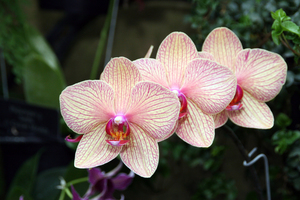 Disa. uniflora
'Buff'
photo by
Kathy Barrett
Disa. uniflora
'Buff'
photo by
Kathy Barrett
Member Plants
1 plant cultivated by members of ORCHIDS.ORG. See All Member PlantsUpcoming Global Events

24th World Orchid Conference, Germany
There are currently no photos of plants of
Disa uniflora
for sale by members of ORCHIDS.ORG.
Below are other recent plants for sale:
Log in to Add a Comment

Author is Ken Slump, posted about 5 years ago
A 12-Step Plan for Becoming a Successful Orchid Grower
IF YOU ARE NEW TO THE ORCHID hobby and perhaps feel you are not enjoying the success with your plants that you had hoped for, read throug...
Read More

Author is Roy Tokunaga, posted over 5 years ago
We take water for granted. It falls out of the sky. It flows from the faucet. Oahu city water is considered good for growing Orchids. We use it without thought or concern.
If you study orch...
Read More
Do you have a plant for sale or trade
which you cannot ship or do not want to bother shippping?
No problem.
Click here to make a local-only offer.
It's a free service to our members.
Orchid Species: Disa uniflora
(This name is currently accepted by Kew.)
Disa uniflora is an orchid species identified by P.J.Bergius in 1767.
Genus
Disa (Disa.)
Grex
uniflora
(name currently accepted by Kew)
(name currently accepted by Kew)
Parents
Species
Author
P.J.Bergius
Year
1767
ORIGIN: Found on Table Mountain in South Africa at elevations of 100 to 1200 meters near permanent, fast moving water along streams, rock crevasses, seepage areas and waterfalls.
DESCRIPTION: This small to medium sized, cool to cold growing terrestrial orchid has stout leafy stems with lanceolate to elongate-lanceolate, acute, spreading leaves and blooms in the fall through spring on a 3 to 8 [20 to 30 cm]long, raceme with lanceolate, acuminate bracts and 1 to 3 flowers, occasionally more, occurring through the summer and is found growing up through cracks in the sandstone that have standing water for the summer months. Best grown with cold to cool temperatures, potted in sphagnum and coarse river sand with great drainage, heavy air movement, high humidity and semi-shade year round will ensure a healthy plant.
FLOWER SIZE: To 4 inches [8 to 12 cm] -- information provided by Jay Pfahl, author of the Internet Orchid Species Encyclopedia (IOSPE).
DESCRIPTION: This small to medium sized, cool to cold growing terrestrial orchid has stout leafy stems with lanceolate to elongate-lanceolate, acute, spreading leaves and blooms in the fall through spring on a 3 to 8 [20 to 30 cm]long, raceme with lanceolate, acuminate bracts and 1 to 3 flowers, occasionally more, occurring through the summer and is found growing up through cracks in the sandstone that have standing water for the summer months. Best grown with cold to cool temperatures, potted in sphagnum and coarse river sand with great drainage, heavy air movement, high humidity and semi-shade year round will ensure a healthy plant.
FLOWER SIZE: To 4 inches [8 to 12 cm] -- information provided by Jay Pfahl, author of the Internet Orchid Species Encyclopedia (IOSPE).
Other Names
| Genus Name | Genus | Grex Name | Year | Author | |
|---|---|---|---|---|---|
| Add+ | Satyrium | Satm | grandiflorum | 1794 | Thunb. |
| Add+ | Disa | Disa | barellii | 1880 | De Puydt |
| Add+ | Disa | Disa | grandiflora | 1782 | L.f. |
Most awarded/recent cultivars:
Disa. uniflora 'Early Bird'
(4 awards from
2013
to
2015)
Disa. uniflora 'Hyun Sook'
(3 awards from
2003
to
2005)
Disa. uniflora 'Mendocino'
(2 awards from
1999
to
2001)
Disa. uniflora 'Patterson'
(2 awards in
1976)
Disa. uniflora 'Longwood's Decisive Dynamo'
(2018)
Disa. uniflora 'Fasangarten'
(2018)
Disa. uniflora 'Heidi'
(2018)
Disa. uniflora 'Charlie'
(2018)
Disa. uniflora 'Wössen'
(2013)
Disa. uniflora 'Samantha'
(2010)
Disa. uniflora 'Golden Lode'
(2010)
Disa. uniflora 'Louis'
(2008)
Disa. uniflora 'Christmas Gold'
(2007)
Disa. uniflora 'Red Glory'
(2005)
Disa. uniflora 'Paleface'
(2004)
Disa. uniflora 'Buff'
(2004)
Disa. uniflora 'Kathy'
(2001)
Disa. uniflora 'Kirsty'
(2001)
Disa. uniflora 'Peach Fuzz'
(2000)
Disa. uniflora 'Lafayette'
(1999)
Featured Site Articles
Read Latest Articles
Beginners Start Here

Water: The Most Important Nutrient
New Topics
- Al Schotz asked question Gomesa bifolia in category General Discussion
- Kjell Meershoek started topic Re-inventing an orchidarium.. your thoughts in category Curiosity
- David George asked question Odom's Fascination - an unusual orchid in category General Discussion
- Carol Holdren asked question Grow Tent in the Garage in category General Discussion
- David George asked question rlc Caotan Beauty found at Home Depot in category Cattleya Alliance
New Comments
- Kjell Meershoek commented on topic "Re-inventing an orchidarium.. your thoughts" by Kjell Meershoek
- Inga Kruppa commented on member plant Acacallis cyanea Х Paradisanthus micranthus by Inga Kruppa
- Carol Holdren commented on topic "rlc Caotan Beauty found at Home Depot " by David George
- Carol Holdren commented on topic "Odom's Fascination - an unusual orchid" by David George
- Dr. Florian Wolf commented on topic "Wild. Lisa Devos" by Maria Fernandez
- Michael Valcarcel commented on member plant Rlc. Chief Takanaka by Walceli Muniz Valverde
- Michael Valcarcel commented on member plant Rlc. Montana Spirit by Michael Valcarcel
- Michael Valcarcel commented on member plant Ctt. Blazing Sun by Michael Valcarcel
- Michael Valcarcel commented on member plant Bc. Spotted Clown by Michael Valcarcel
- Maria Skrypnyk commented on member plant Yamadara Redland Sunset by Maria Skrypnyk
- André Pessina commented on topic "Odontocidium Orchid fungus?" by Kristin Dorris
- Linda Hartman commented on topic "Image of a plant please" by Leshya Perkins
- Paul Reavis commented on orchid Milt. Kismet
- Christiaan Viljoen commented on member plant Psh. fragrans by Christiaan Viljoen
- Christiaan Viljoen commented on member plant Z. maculatum by Christiaan Viljoen
- Christiaan Viljoen commented on member plant C. Gaskell-Pumila 'Azure Star' by Christiaan Viljoen
- Robert H. Findlay commented on member plant Rlc. Joy Sokabe var. Volcano Queen by Sally K
- James Lunsford commented on member plant Lc. Sagarik Wax 'African Beauty AMO/AOS x Blc. Cherry Suisse'Kauai' HCC/AOS var. Cattlyea 'Hybrid ' by James Lunsford
- John Varigos commented on orchid Bulb. schwarzii
- Linda Hartman commented on topic "Issue with Blc. Ben O'Neil "Jubilee" by Glenda Ratliff




